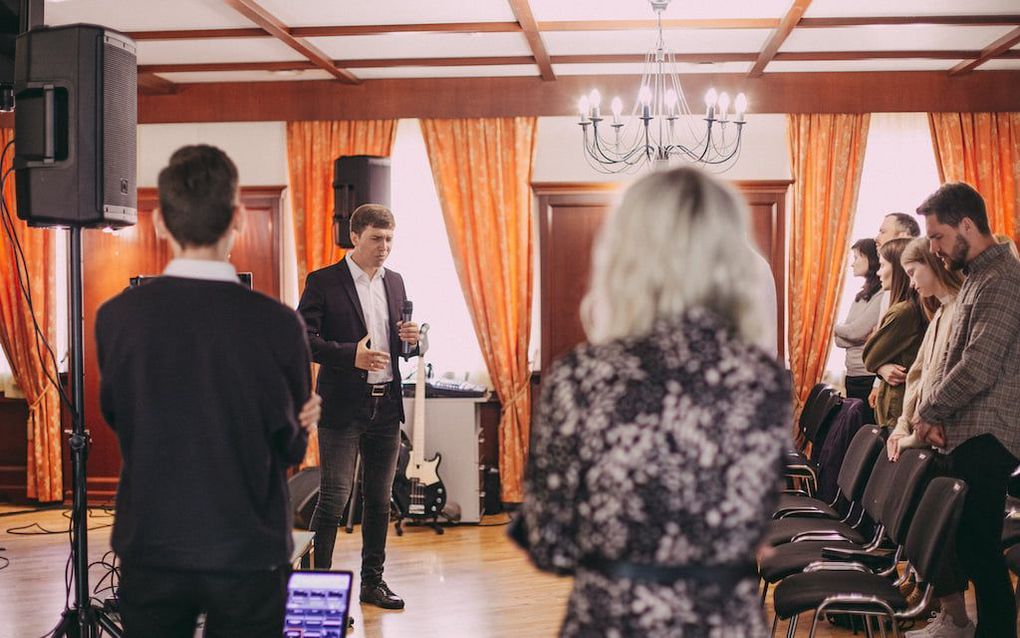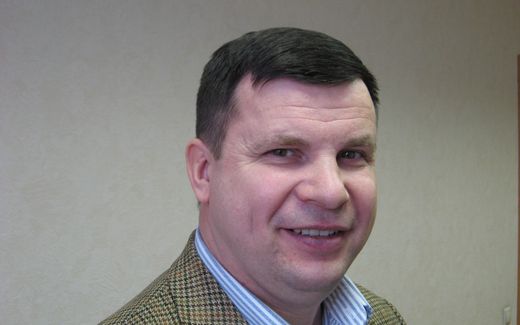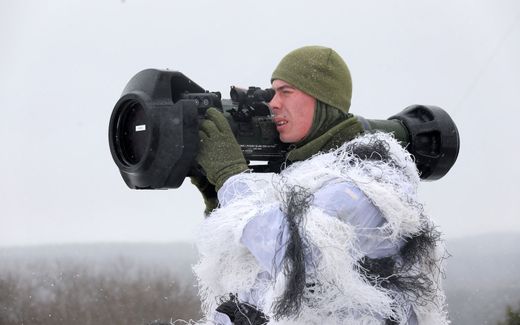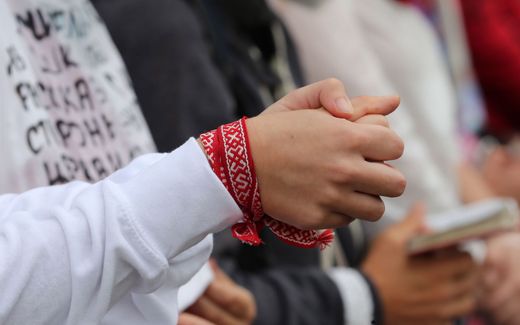Sending weapons to Ukraine should be condemned
14-05-2022
Opinion
William Yoder

Russian Pentecostal worship. Photo Facebook, Russian Church of Christians of Evangelical Faith
Opinion
Shock was the overriding reaction felt by Russia’s Protestants when the invasion of Ukraine broke loose on 24 February. “I never thought I would live to see something like this!” was a feeling expressed by thousands. Yet once the initial dust had settled and once the Kremlin’s decision appeared irreversible, it became a near consensus among the general population that Russians need to “stand together and see this thing through. ”This may well help explain Vladimir Putin’s surge in popularity with approval ratings hovering around 85%. There is much talk of hypocrisy: Naughty tongues claim Western ire directed at Russia was provoked by Russia smashing America’s monopoly on foreign invasions.
Shrinkage is the order of the day. A leader at Russia’s Baptist Union headquarters in Moscow chuckled when he overheard me conversing with another US-American in English. Seeing two Americans at once has become a rarity in Russia. The Baptist Union’s every-fourth-year congress is scheduled for 19 and 20 May in Moscow. “We’ve sent out very many invitations and do hope that at least several Americans will pay us a visit,” one of the Union’s secretaries stated.

The author was born in 1950 in Ohio, USA. He first came to Germany and Europe in 1971 and never really left. He now lives with his wife in the Russian enclave of Kaliningrad. He has a German address, is a citizen of the USA and since November 2021, also of Russia.
It appears that entertainment stars, intelligentsia, computer programmers and Protestants are prominent among the groups most eager to emigrate. The sudden flight of Moscow archbishop Dietrich Brauer to Germany in mid-March sent shock waves through Lutheran circles. One recent report had 30.000 Russians and 10.000 Ukrainians marooned in Mexico awaiting entry into the USA. The “horizontal rapture” that accommodated the outbreak of hostilities transported approximately 300.000 citizens beyond Russia’s borders.
The Western embargo on the transfer of funds to Russia has sobered more than just computer programmers; Southern Baptists’ immense “International Mission Board” pulled its last die-hard missionaries out of Russia as soon as this embargo took hold. Missions and denominations incapable of exiting are working on new channels of funding routed through third countries such as Hungary, Serbia and Kazakhstan.
The current situation
An insider reported on a 3-way split within Russian Baptist circles: Unpolitical, pro-Western (he called them “colonialist”) and nationalist, pro-government groups. A statement by the “Russian Union of Evangelical Christians-Baptists” (RUECB) on 8 April assured that “we make no political evaluation of those involved in the conflict. We call all to peace and human mercy.”
This attitude reflects traditional Baptist aloofness regarding the political realm. Sergey Ryakhovsky, head bishop of the „Associated Russian Union of Christians of Evangelical-Pentecostal Faith” (ROSKhVE), has in contrast stoked controversy especially in Ukraine and the West by making statements regarded as overly-supporting of the war effort.
A leading Baptist theologian in Moscow asks whether our faith is now up to the difficult task at hand. “War was completely beyond our list of possible options,” he states. “For some believers it is as if God is deaf; He does not hear our prayers. We are at a loss on how to pray, on what to preach. We Russians are suddenly regarded as outlaws by the West and we do not know how to react. We can find logical reasons to justify the current war, but how can we square that with Jesus’ commands?” The alienation between Russian and Ukrainian evangelicals appears profound and lasting. In social networks, Christians in Ukraine and Russia are expressing themselves in ways far beyond the constraints of the Christian faith.
Vitaly Vlasenko, General-Secretary of the “Russian Evangelical Alliance”, concludes that we need nothing less than another Moses, a new leader capable of showing his people the way towards liberation. “We must remain convinced in the power of the Christian message,” adds Vlasenko. “We are otherwise lost.”
Not surprisingly, the current crisis has at the same time brought Russia’s denominations closer to one another. In April, both ROSKhVE and the RUECB produced statements condemning the eventual banning of the Moscow Patriarchate from Ukraine. Historically, the Moscow-based Orthodox patriarchate is Ukraine’s largest Christian denomination.
Another Moscow pastor has a completely different reading on events and peers far beyond the immediate question of war. He claims to feel comfortable regarding the present, global transition. The fog has lifted; the sheep and goats are separating. The true state of affairs is becoming visible. The identity of the church’s true friends – and its fair-weather-friends – is becoming apparent. After 35 years, Russia is once again willing to stand up and defend its own interests. The can-do attitude has returned. Only such determination can make a country strong.

Who truly is a Russian patriot, and who is content to remain the foreign appendage and arm of Western sponsors? “Our church organisations must find their funding in Russia – there are monies to be found here,” this evangelical pastor claims. He concludes that one can no longer sit simultaneously on two chairs in the secular realm, collecting one’s profits in Russia and spending them elsewhere.
A theologian friend in Kiev has thrice demanded that this Moscow pastor publicly distance himself from Russian actions in Ukraine. Yet this pastor finds that perspective superficial and demands instead that one reckon with the much larger, global context.
The danger of hyperbole
It’s important to remember that full mobilisation has occurred only in Ukraine. Indeed, the call-to-arms of all able-bodied males between 18 and 60 was a reason for emigration during the first days of the war. Fortunately, not all refugees are traumatised and in rags. Ukraine refugees and Russian vacationers are meeting – usually unwillingly - on the beaches of the Turkish resort town of Antalya. I am personally aware of multiple cases in which Ukrainian citizens residing long-term in Russia have availed themselves of the current golden opportunity to emigrate westward.
Moscow pastor Leonid Kartavenko reports that Antalya hosts at least 800 refugees from Ukraine. With aid from the Ukrainian consulate, half of this number found their way to an evangelical Easter service. Another Moscovite reports that, despite all departures, church attendance is increasing. People on the street are open to conversation on matters of faith, much as if it were 1990 once again.

In contrast to Russia, Ukraine is a war zone and individual freedom is more restricted there. Russians continue expressing anti-war sentiment on social media, including YouTube. Vitaly Vlasenko caused waves when in the name of the Russian Alliance he apologised on 14 March to Ukrainians for the suffering the current conflict has caused them. Bishop Brauer explained in Germany that he fled Russia in order to escape possible future, not current, repression (see German Wikipedia).
When watching Western media, one would think the present Ukrainian conflict qualifies as total war. Yet tragically, weeping mothers, dead civilians and damaged buildings can be found on all sides. The West prefers to hide the general, larger picture. Observers such as the US-American veteran Scott Ritter note that the Russian army began its operation with great caution, hoping to be greeted with bread and salt. Until recently, rail lines and communal services remained intact and Kiev is still visited almost daily by Western politicians. Phone (and gas) lines between Ukraine and Russia have been working. Yet the war is dragging on, the infrastructure is now being attacked and conditions are bound to get worse.

A note on the usage of the term “war”: According to the Russian interpretation, the current war began in February 2014 with the putsch in Kiev – nearly 14.000 deaths over the course of eight years followed. The current “special operation” is consequently only intended to end a war, and not to start one. This at least was Russia’s reasoning in February 2022.
The only solution
The naked emotion so apparent in Western Europe destroys logic and reason. The establishment of peace requires cooler heads. Describing the conflict in black and white is massively counterproductive. On the essential point there is no need whatsoever for wavering nor soul-searching: Negotiation and compromise are the only route to a peace in the foreseeable future! Continuing the shipment of weapons or awaiting a decision on the battlefield deserves only the sharpest possible condemnation. The region of Ukraine and its people must not be destroyed! As the German politician Sahra Wagenknecht claimed on 5 May, a Russian defeat would require a Western victory in a nuclear conflict. The warmongers dare not be offered such an opportunity.
Related Articles






